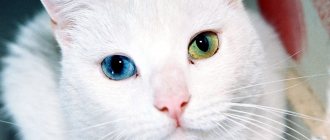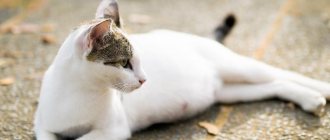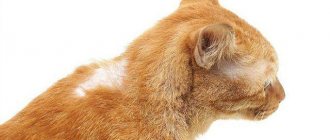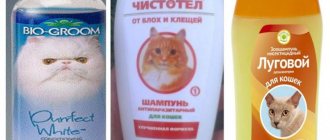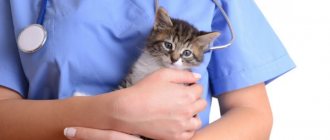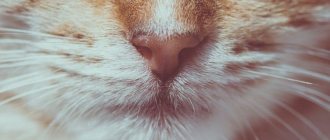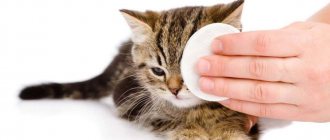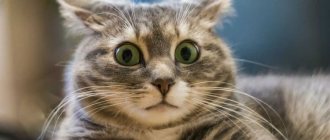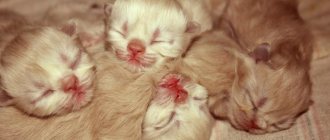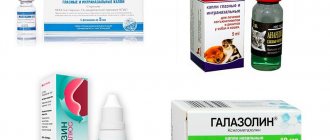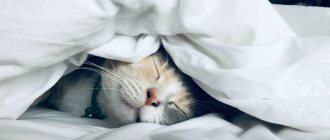11431Pavel
When a cat has a swollen belly, he needs urgent help. This condition is dangerous for the animal, not only by impaired mobility, but also by changes in the functioning of internal organs. In order to carry out timely and competent therapy, it is necessary to immediately accurately determine the cause of the unpleasant phenomenon. This is best done by a veterinarian, and it is he who should be contacted if problems with your pet’s health arise. If a cat's stomach becomes suddenly swollen, the situation requires immediate veterinary attention.
Why does deviation occur?
The development of the deviation is influenced by pathological and physiological factors. The first are dangerous to health and require the intervention of a veterinarian. The latter are natural, so they are easy to figure out on your own.
Hazardous factors
The presence of pathology is indicated when the abdominal muscles do not relax for more than a day, and the pet’s condition gradually worsens. This is due to the following reasons:
- Constipation
. It occurs due to intestinal spasms, improper feeding, ingestion of a foreign object, helminthiasis and the accumulation of hair in the intestines during heavy shedding. Without prompt treatment, constipation can lead to intestinal obstruction and death.
- Peritonitis
. The peritoneal mucosa becomes inflamed upon contact with gastric or intestinal contents. The penetration of foreign microflora is fraught with epithelial detachment and necrosis.
- Poisoning
. Against the background of acute intoxication, painful spasms occur in the lower part of the stomach.
- Abscess
. The danger of purulent formation in the abdominal organs lies in its rupture and subsequent blood poisoning.
- Injury
. When internal organs are damaged, their contents leak into the peritoneum. The further reaction is similar to peritonitis.
- Cholecystitis (biliary colic)
. Inflammation of the gallbladder occurs when there is excessive production of bile or the formation of stones. The patient's peritoneum hardens and excruciating pain occurs.
- Pyometra
. Purulent inflammation in the uterus appears with frequent mating, hormonal disorders and infections.
- Ascites (abdominal dropsy)
. With this disease, free fluid accumulates in the abdominal cavity. Most often this occurs as a result of poor circulation.
- Neoplasms
. The growth of the tumor is reflected in the size of the peritoneum. Most often, neoplasms occur in older animals.
- Panleukopenia (distemper)
. Infection with the virus occurs in utero, during a bite by a blood-sucking insect, or through contact with an infected animal or its biological fluids.
All these causes can be eliminated with medication. Without timely help, even simple constipation becomes dangerous.
Non-hazardous factors
An enlarged and dense belly in a cat also appears for natural reasons. These include:
- Flatulence
. A tight stomach appears when there is an excess accumulation of digestive gases. Usually this condition goes away with dietary adjustments, but sometimes it is a sign of helminthiasis, dysbacteriosis, intestinal obstruction and other diseases.
- Pregnancy
. Shortly before childbirth, the size of the uterus increases greatly. The abdominal muscles become harder to protect the kittens inside the womb. The condition returns to normal a few hours after the birth of the offspring.
- Stress
. By tensing the abdominal muscles, the pet tries to protect itself from the source of fear or unpleasant touches. This behavior is typical for animals that have suffered physical abuse.
- Obesity
. If the pet is neutered and inactive, then it quickly gains weight. This situation can be easily managed with diet and increased activity. Remember that the lack of response threatens premature death from fatty degeneration of the myocardium, that is, obesity of the heart.
Associated symptoms will help distinguish pathological factors from physiological ones. If they are detected, you must immediately contact a veterinary clinic.
Disease prevention
To avoid abdominal enlargement and cramps, you should use the following rules:
- Buy quality kitten food made from natural ingredients. It is unacceptable to feed small pets canned food, as well as food that is consumed by humans. It is better to give a newborn cat special mixtures for a certain age, which can be found in pet stores.
- Don’t forget to drink water; every meal should be washed down with a sufficient amount of liquid. Therefore, it is recommended to provide the animal with constant access to clean water.
- Do fasting days with minimal consumption of carbohydrates and fiber.
- Gradually switch from baby food to adult food, first consult with a veterinarian.
- Be examined every six months to exclude the presence of serious pathologies.
- Monitor the quality of the animal's fur.
- Provide your pet kitten with timely water treatments.
- Monitor your pet's sleeping area, clean and ventilate it in a timely manner.
Important! To prevent your kitten from developing a big belly again, it is recommended to carry out deworming regularly.
Bloating in a kitten is an unpleasant symptom that appears as a result of infectious and nutritional disorders. If a problem is detected, you must immediately contact a veterinarian and undergo an examination. Based on the results of diagnostic procedures, further treatment tactics will be determined and all necessary recommendations will be prescribed.
Symptoms indicating illness
In addition to the duration of the bloating, it is important to consider any warning signs. Possible pathology is indicated by:
- inflammation, yellowing or blue discoloration of mucous membranes;
- too rapid enlargement of the peritoneum or sudden weight loss;
- frequent vomiting, diarrhea, or lack of bowel movements for more than 2 days in a row;
- lethargy and fever;
- pain when emptying the bowel or bladder;
- dullness and hair loss;
- foam, blood or parasites found in vomit and feces;
- increased thirst and loss of appetite;
- profuse drooling;
- severe pain in the abdominal area upon palpation.
If a pregnant cat's swollen belly does not return to normal within 1.5 days after birth, call a veterinarian. This condition is typical for unfinished labor. The stuck fetus will have to be removed surgically.
What to do to eliminate the pathology?
If the cause of bloating is constipation, then the drug Duphalac will help to cope with the problem.
If the kitten's sides are swollen due to a severe internal illness, the doctor will hospitalize the pet and, if necessary, perform surgery. In other cases, you can deal with the problem at home. For constipation, you can give your pet the drug Duphalac and use microenemas. Vaseline oil will help improve digestion; its dosage is 0.1 ml per 100 g of weight. It is recommended to give the product 2-3 times a day.
If the cat's swollen sides are a sign of helminthic infestation, in this situation antihelminthics will help normalize the condition. Doctors at the Zoovet clinic point out that not every drug is intended for kittens aged 2-3 months. Therefore, the veterinarian must select the medicine, taking into account the baby’s age, the degree of invasion and other individual characteristics.
After giving birth, the cat's abdomen will return to its normal position without special treatment. The problem of overeating is easy to eliminate. Often, increased appetite is associated with a lack of vitamins and other elements in the body. Therefore, it is better to feed your cat with ready-made food, where all the ingredients are balanced and selected for a certain age.
Bloating in kittens
When purchasing a kitten, always inspect its tummy. In a healthy animal it should be soft and small. A temporary increase may occur after a recent feeding or shortly before going to the toilet. If a healthy baby's tummy becomes the size of a balloon or a pear, be sure to worm your pet and take him to the vet. Anti-parasite tablets are given at intervals of 2 weeks. At the first ingestion, all adult individuals die, and at the second, the remaining eggs, which have evolved into adult worms, die.
In what cases should you contact a veterinarian?
The most dangerous causes of an enlarged abdomen in a kitten are peritonitis and ascites. Without timely veterinary care, the pet may even die. How to recognize these dangerous pathologies:
- Peritonitis is an inflammation of the abdominal cavity of an animal. It is necessarily accompanied by the following symptoms: elevated body temperature;
- vomiting;
- refusal of food;
- weakness;
- apathy.
Peritonitis and ascites are life-threatening conditions, so you need to take the kitten to the vet as soon as possible. Only a specialist can treat these pathologies, and sometimes even minutes count.
Diagnostics and therapy
To make a diagnosis, blood, urine and feces are examined, ultrasound and x-rays are done. During the examination, the veterinarian palpates and listens to the peritoneum. Depending on the results that explain why the cat has a hard stomach, the doctor decides what to do to normalize his condition.
Help with non-dangerous causes of bloating
Flatulence caused by poor nutrition can be eliminated by adjusting the diet. A ban is imposed on any products that increase gas formation (legumes, flour, fresh vegetables). Remember that milk is contraindicated for adult animals, as they develop lactose intolerance. To normalize intestinal function, your veterinarian may recommend a course of probiotics.
Excessive weight can be eliminated by reviewing your diet. The animal is prescribed less high-calorie food and the usual portions are reduced. Daily physical activity is complemented by joint games.
A big belly in a scared cat can be healed with time. Do not impose your affection and let your pet get used to the unfamiliar environment.
Treatment of the underlying disease
Surgery will be required to eliminate pyometra. During the operation, the veterinarian cuts out the uterus, that is, performs sterilization. Surgeries are also necessary to remove a tumor, intestinal obstruction, foreign object, or the consequences of severe trauma.
All infectious diseases are treated with antibiotics and antiviral drugs, and helminthiasis with anthelmintics. Intoxication with poisons is eliminated by administering an antidote and gastric lavage. In case of ascites, excess fluid is pumped out of the animal and a course of diuretics is prescribed.
To treat constipation, use Vaseline oil or laxatives. Such therapy is permissible only in the absence of intestinal obstruction. Otherwise, taking these drugs may cause intestinal rupture.
Treatment for an abscess depends on its complexity. Most often, drug therapy, which involves taking antibiotics and anti-inflammatory drugs, is sufficient. In case of extensive inflammation, the ulcers are removed by a surgeon.
Cholecystitis is treated with antibiotics and proper nutrition. The animal is transferred to a veterinary food that fights gallstones.
Any therapy must be carried out under the supervision of a veterinarian, with dosages clearly specified by him.
Treatment methods
If a cat has a swollen belly, what should the owner do at home:
- palpate gently. The stomach should not be rock-hard, and touching should not cause painful sensations in the animal;
- remember what the pet ate and what medications the pet took over the past 3 days.
The cat's hind legs have failed: causes and treatment
If the animal remains active, can go to the toilet without problems and does not experience problems with bowel movements, it does not need to be taken to the clinic right away. However, in the following days, it is necessary to closely monitor the general condition of the cat and the degree of bloating in its abdomen.
Important! When a cat has a bloated stomach, many owners try to help and give a massage, but this is prohibited. If the cause is inflammation or fluid effusion, massaging the tummy will greatly aggravate the condition.
Nutrition correction
A bloated belly in a domestic cat can be treated with proper nutrition. The number and size of portions is calculated by the veterinarian based on the weight and age of the animal. If your pet eats ready-made food, you should pay attention to options for cats with gastrointestinal diseases or sensitive intestines.
Cats eating homemade food need to include boiled or baked vegetables (zucchini, peppers, tomatoes), fat-free meat and plenty of fresh water in their diet. You can add dietary supplements with natural fiber, which normalizes the functioning of the digestive organs.
Note! If your pet has a habit of eating food, you need to block access to the trash can and hide all food from the table.
Drainage of fluids from the abdominal cavity
If the condition is severe, the cat will need a drainage system, which is installed at the veterinary clinic. Drainage tubes are inserted into the abdominal cavity and excess fluid or blood is removed through them. The system is installed for several days. As a result, the amount of liquid collected per day should not exceed 50-100 ml. After this, the drainage is removed.
Diuretic
Diuretics remove excess fluid from the body through urine. Such treatment should be carried out under the supervision of a physician. Firstly, it puts a lot of stress on the kidneys. Secondly, with long-term use, diuretics wash out potassium and other elements, and also increase blood pressure.
Surgery
Internal bleeding, tumors and tears can be corrected with surgery. The sooner the owner consults a doctor, the easier it is to prevent the consequences of the disease.
Surgery is required as a last resort
Abdominal bloating in a domestic cat is not always a sign of illness. If the stomach is swollen for the first time, it is soft and touching does not cause pain in the cat, the cause may be improper nutrition or swallowing air. Symptoms such as general weakness, vomiting and diarrhea, a hard and hot stomach are dangerous and indicate an aggravated pathology. In this case, you should immediately take the cat to a veterinarian for examination.
Probability of death
The likelihood of death depends on the situation. The exact indicator is determined only by diagnostic results.
Remember that complications are possible even with non-hazardous factors. The bloating puts pressure on the chest, preventing normal breathing. There is also a high risk of gastric volvulus, intestinal rupture, tissue necrosis and sepsis. To avoid unpleasant consequences, contact your veterinarian if you have any alarming symptoms.
